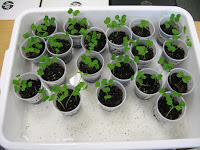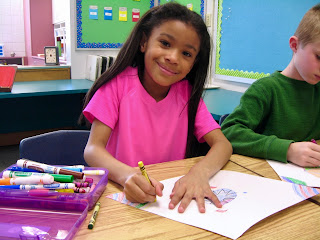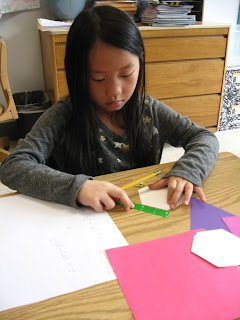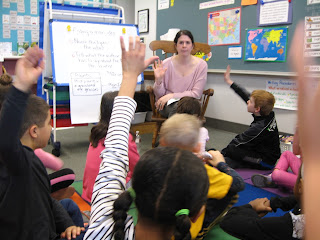One of the things I love best about school is that you don’t
always have to get it right the first time. If a lesson doesn’t take, you can teach
it over in a slightly different way. If a child makes a mistake, you can set
him up to try again - and again. School is all about “in progress” and “to be continued" and not so much about "done." We take the long view. With 179 days, it feels like time is on our side.
Until, suddenly, it isn't.
We are fast approaching the end of second grade. And it’s more than just a school calendar that tells me that we are nearly done. The plants that are part of our science experiment are
overflowing their cups. Our math workbooks are full. Our markers have run dry
and our crayons are broken. We are out of pink erasers. The squares on our
carpet that once easily held 18 little bodies just aren’t big enough now.
I can tell that these second graders are ready for more. They are ready for things like writer’s notebooks, multiplication tables, Gmail, and cursive. I hear
them sometimes talk of second grade in the past tense now. I see them peek into
their third-grade neighbors’ classroom, intrigued. On our field trip to downtown Milwaukee yesterday,
they charged around the city like big kids, fearless and full of adventure.
We have had a great time. Catapults, clocks, valentines and Secret Snowflakes. Thoughtful Logs, character riddles, maps, and math
mountains. Book boxes, clay beads, goal cards, biomes, and every week, Stars and Wishes. We won a trophy together. We had some bumpy times, too, and learned, I
hope, important life lessons about friendship, tolerance, and respect.
New to second grade this year, I’ve had plenty of times when
I didn’t get it right the first time. The challenges of learning a new
curriculum and other things were greater than I’d expected. I hope that what I
lacked in know-how, I eventually made up for with hard work and heart. I will be
forever grateful that I made the move from first to second grade. It is a
joy to work with children who are so curious and capable. They amaze me.
Thank you for your kindness, your patience, and your
willingness to help whenever I’ve asked - and even when I haven't. Thank you for reading this blog.
Writing it has been my way to reflect; to take stock and put small moments from the classroom into a larger context; to think about next steps for the children.
And there are always next steps. These children’s school stories, though done by one
measure, are really just “to be continued.”
I wish them and all of you the very best.
Mark Your Calendars:
Thurs., June 1 - All-school field trip to Bayside Middle School to see the musical (AM).
Fri., June 2 - Stormonth Talent Show, K-2 performers (AM).
Sat., June 3 - PTO-sponsored Cupcake Run/Walk and Carnival. See you there!
Mon., June 5 - Stormonth Talent Show, Grades 3 and 4 performers (PM).
Tues., June 6 - Field Trip to the Boerner Botanical Gardens (AM). Keep those permission slip coming!
Wed., June 7 - Volunteer Breakfast (8 AM) and Year-End Assembly (9 AM); Poetry Cafe in our classroom, (2 PM).
Thurs., June 8 - Last day of school for students.
Fri., June 9 - Last day of school for teachers.
Mon., May 29 - Memorial Day. No school.
Wed., May 31 - First grade visit to second grade.
Wed., May 31 - First grade visit to second grade.
Fri., June 2 - Stormonth Talent Show, K-2 performers (AM).
Sat., June 3 - PTO-sponsored Cupcake Run/Walk and Carnival. See you there!
Mon., June 5 - Stormonth Talent Show, Grades 3 and 4 performers (PM).
Tues., June 6 - Field Trip to the Boerner Botanical Gardens (AM). Keep those permission slip coming!
Wed., June 7 - Volunteer Breakfast (8 AM) and Year-End Assembly (9 AM); Poetry Cafe in our classroom, (2 PM).
Thurs., June 8 - Last day of school for students.
Fri., June 9 - Last day of school for teachers.










































